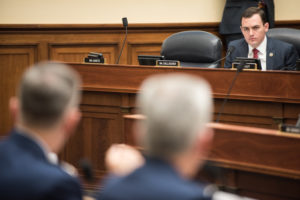The House on Tuesday voted in favor of establishing a new select committee focused on China’s technological and security priorities and ongoing competition with the United States.
Rep. Mike Gallagher (R-Wis.), a member of the House Armed Services Committee, is set to chair the new panel which was approved by a 365 to 65 vote.

“China is the only country with both the intent to reshape the international order and, increasingly, the economic, diplomatic, military and technological power to do it. The threat posed by [China] is not abstract. [China’s] aggression is not limited to Taiwan, the South China Sea, Hong Kong or even Xinjiang,” Gallagher said in floor remarks ahead of Tuesday’s vote. “We see this aggression here at home where [China] has stolen American intellectual party, technology and industrial capacity, undermining our economy and good-paying American jobs.”
An unclassified version of the new National Defense Strategy released in late October detailed the “pacing challenge” of China as the department’s prime focus over the more “acute threat” presented by Russia, citing Beijing as “the most comprehensive and serious challenge to U.S. national security” (Defense Daily, Oct. 27).
Gallagher and new House Speaker Kevin McCarthy (R-Calif.) both reiterated an emphasis on ensuring the select committee’s work and eventual policy recommendations are done on a fully bipartisan basis.
“You have my word and my commitment, this is not a partisan committee. This will be a bipartisan committee. That is my hope, my desire, my wish that we speak with one voice, that we focus on the challenges that we have,” McCarthy said on the House floor on Tuesday. “If you want to end our dependence on China, this committee will investigate it. You want to protect our national security? This committee will work on it. If you want to stop the theft of intellectual property and bring supply chains back to America, this committee will work to make it happen.”
All 65 ‘votes’ against establishing the committee were cast by Democrats, with 146 members of the party joining all Republicans in supporting the measure.
Rep. Adam Smith (D-Wash.), set to be the top Democrat on the House Armed Services Committee, cited his support for the new panel on Wednesday while noting his reservations if its work becomes partisan in nature.
“It can go in a couple different directions. I think it can be incredibly productive because strategic competition is going to be very important on a whole series of different realms. Or it can just become a China bashing exercise. Now, I have worked with Congressman Gallagher for a while. He is a very smart, very serious person. And that gives me cause for optimism that he wants to take this in the right direction,” Smith said during a Brookings Institution discussion. “It could absolutely go sideways in a way that creates more conflicts than it solves.”
Smith said discussions are ongoing over who should be the top Democrat on the new select committee.
The Pentagon in its latest “China Military Power” report, released in late November, said it expects Beijing to “basically complete modernization” of its military capabilities by 2035, to include potentially having a stockpile of 1,500 nuclear warheads by that time (Defense Daily, Nov. 29).